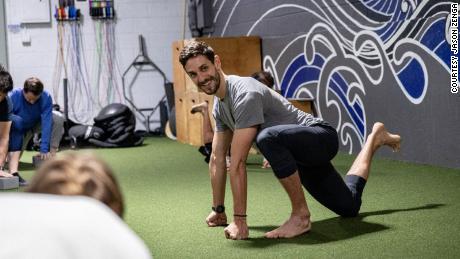
When looking for a Georgia personal trainer salary, there are many things to consider. The expected growth, the location, and certification requirements are just a few of these factors. Below are the expected growth and average salaries for this position. You should know that there is an average salary for this position, and that the salary may vary from one city to the next.
Average salary
Personal trainer salaries range in Georgia from $18,319 to 101,573. The median salary for Personal Trainers is $51,879 per annum. These salaries would include an average state income tax rate of 6% and federal tax at 22%. The average personal trainer in Atlanta could make $42,310 per annum, or $1763 per check.
There are many factors that can influence the salaries for a Personal Trainee, such as location, sales commission, and experience. These are just a rough idea of what a personal trainer can expect. They can work for fitness centers, gyms, and be self-employed.

Certifications are required
Georgia does not require a statewide certification for personal trainers, however they should have some education and training. Many employers are looking for GED or high school graduates. Often they also need to have some type of certification, such as CPR and first aid. A post-secondary degree is not necessary, but it can give an individual valuable background knowledge that will allow them to start sooner. Those without certifications may need to train under an experienced personal trainer in order to gain more knowledge and experience.
The University of Georgia's Griffin Campus offers a certificate program in personal training. The World Instructor Training Schools offers the program. It consists of a 30-hour internship and eight weeks of coursework. The course includes 62 credits hours of classroom instruction and practical training. There is also a national certification exam. The curriculum covers many subjects such as exercise physiology and biomechanics.
Locations
The personal trainer profession is growing in Georgia faster than most states. According to the labor department, there should have been a 24.7 per cent increase in employment between 2008-2018. This should result in around 70 new positions a year. Savannah is the most popular location. Sandy Springs and Alpharetta also make the top ten.
Georgia is a diverse and multicultural state. While it isn't the most prosperous, it has great healthcare and business freedom. It also ranks 26th in terms of fitness. Personal trainers will find plenty of opportunities in its cosmopolitan populations.

Expected Growth
A personal trainer in Georgia earns on average 4.2% more than the national average, and those who have been in the industry for several years can expect to earn 3.8% more. According to Georgia labor, the state's personal trainer workforce is expected increase by 24.7% from 2008 to 2018. An average personal trainer's annual salary in Georgia is $38,000. Most personal trainers in Georgia have a bachelor's level degree.
Georgia has an extremely high obesity rate. More than 65% Georgia adults are overweight or obese. The state's personal trainers are responsible for helping people to achieve good health through exercise, nutrition, and other activities. Their job will involve working with a diverse group of individuals, from young children to elderly people. Some of these individuals may have joint problems and need special exercises.
FAQ
When I exercise, should I consume alcohol?
Alcohol has calories, so it's not recommended to consume large amounts while working out. It is possible to increase your endurance by drinking moderate amounts of alcohol (one glass per day). It may also reduce fatigue from exercise and muscle aches.
Why is physical fitness important?
Our health is dependent on our physical fitness. Exercise is important to maintain your weight, strength and flexibility as well our cardiovascular system. Exercise helps you sleep better at night, reduces stress and improves self-esteem. It also increases your energy throughout the day.
What is exercise good for?
Exercising helps you lose weight, build muscle mass, increase energy levels, reduce stress, and improve sleep quality. Exercise has many benefits, including improved moods, higher self-esteem, greater productivity, and lower risk of heart disease.
How exercise and nutrition can help you to have a better life?
Exercise can help you lose weight, gain muscle mass and reduce stress. Nutrition is vital for energy, mood, sleep, and overall health. To live longer, you should eat less meat, moderate your alcohol intake, stop smoking, and get regular exercise.
What should I eat before I work out?
No. You don't need to eat anything before working out. But if you're feeling hungry after exercising, you may be tempted to snack on light foods like yogurt or fruit.
Does exercise cause me to lose weight?
Yes. Regular exercise will help to reduce weight by burning more calories. Regular exercise can help you burn calories even when your metabolism is not high.
What Does Nutrition Do for Your Body?
By providing all the nutrients necessary for growth and development, nutrition helps your body function well. The best way to ensure that you receive adequate nutrition is to eat a balanced diet with plenty of fruits and vegetables, lean proteins, whole grains, and healthy fats.
Statistics
- Physical activity confers the following maternal and fetal health benefits: a decreased risk of pre-eclampsia, gestational hypertension, gestational diabetes (for example, 30% reduction in risk) (who.int)
- Globally, 28% of adults aged 18 and over were not active enough in 2016 (men 23% and women 32%). (who.int)
- Adolescent girls were less active than adolescent boys, with 85% vs. 78% not meeting WHO recommendations of at least 60 minutes of moderate to vigorous intensity physical activity per day. (who.int)
- In high-income countries, 26% of men and 35% of women were insufficiently physically active, as compared to 12% of men and 24% of women in low-income countries. (who.int)
External Links
How To
How to Stay Fit at 40
This article provides guidance for people who want to keep their bodies strong and healthy, even after turning 40. This article provides basic information on how to eat well, exercise, sleep well, and take care your mental health. This article contains tips and tricks to live longer, healthier lives.
-
Eat right - It is important to eat the right food when you are trying to lose weight. You should avoid processed food products. Instead, eat whole foods, fruits, vegetables. Add something to your diet if it isn't what you like. Don't starve yourself; this won't help you lose weight. Instead, add small amounts more variety to your daily menu. For example, if you normally only eat chicken breast, try turkey once weekly. You might also enjoy rice if you like pasta. These foods should be a part of your daily life.
-
Exercise - Workout at least 3 times per week. You should include cardio activities such running, swimming or biking. You should also ensure you get enough sleep. Sleeping for 8 hours per night is recommended. In addition, make sure you drink plenty of water during the day. Two liters (0.5 gallons), of water should be consumed each day.
-
Sleep Well - Getting adequate sleep is essential to staying fit. The National Sleep Foundation says adults need at least 7-8 hours of sleep each night to maintain their physical and emotional health. Most people only get 6 hours sleep per night. You might consider changing your sleeping patterns if you feel tired all day. It is possible to catch up by making adjustments to your sleep schedule, such as waking up earlier or going to bed later. Also, you might want to turn off your phone before bed in order to relax and wind down. Avoid caffeine after noon. It can cause insomnia.
-
Take care of your mental health - It is essential to take good care of your mind in order to keep your body healthy. Stress can cause poor eating habits and unhealthy lifestyle choices. Therefore, it's important to make sure that you practice stress management techniques such as meditation, yoga, breathing exercises, and relaxation techniques. Do something that is enjoyable for at least an hour. You can do this by going for a walk or reading, playing sports, listening to music, or watching TV.
The above four points will ensure that you live longer and healthier. These are simple steps that will help you reach your fitness goals.